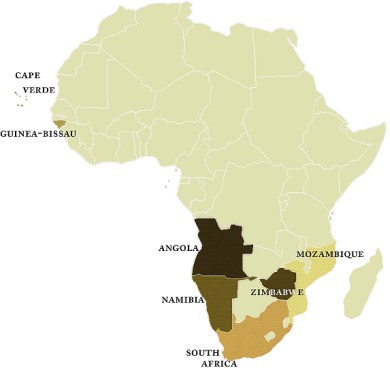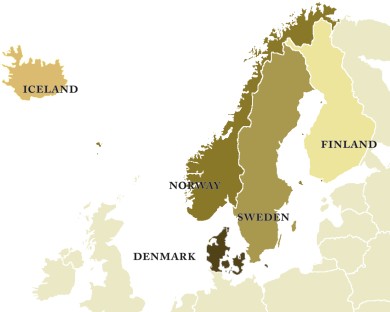About the project and the documentation
This resource provides finding aids of primary source materials that can be found at the different Nordic archival institutions, NGOs and archives of individuals who have been involved in the liberation struggles in Southern Africa.
The available materials are mainly in the Nordic languages, but where possible, English is indicated. The resource holdings include interviews with important actors, photographs, publications and posters and pins from 1960-1996. The finding aids are meant to facilitate information search on the Nordic countries' involvement in the liberation struggles and directs the information seekers to where the information can be found. It also makes available some archival materials in PDF for downloading.
Statements of fact or opinion appearing in articles published here are solely those of the authors and do not imply endorsement by the Nordic Africa Institute as an organisation.
According to the statement issued by the Swedish Data Inspection Board, the materials on this website meet with the Board's stipulated regulations. For information on how personal data is handled, please see our information on Integrity policy. Also follow link for contact regarding correcting or deleting personal data according to GDPR.
Credits
Interviews
Please acknowledge the Nordic Africa Institute and the author (when indicated) if you use interviews from this website, in the format:
Interviewee Name: interview by Author’s Name, date.
First published at https://nai.uu.se/library/resources/liberation-africa , Nordic Africa Institute.
- Example:
Don Mattera: interview by Mardi Gray 9 April 2006.
First published at https://nai.uu.se/library/resources/liberation-africa , Nordic Africa Institute.
Photographs
Please acknowledge the Nordic Africa Institute and the photographer (when indicated) + organisation if you use photos from this website, in the format:
Photo credits: Photographer Name, Organisation, via the Nordic Africa Institute
Countries in Africa
The countries that form part of the documentation project are South Africa, Namibia, Angola, Zimbabwe, Mozambique, Guinea-Bissau and Cape Verde. Material from and information on the particular areas can be found in the archives of the listed organisations and persons.

Nordic countries
The countries in the Nordics are Sweden, Norway, Denmark, Finland and Iceland.

Partners during the project
The Nordic Africa Institute is collaborating with partners in the Nordic countries and Southern Africa who are working on identifying and preserving archives. The projects vary from organising existing material and digitalisation of documents to searching for new archives and preserving oral history. What combines them is an interest for preserving history, for safe-guarding a heritage for future generations.
Links to external websites
A collection of external websites of relevance to the liberation struggle in Southern Africa, including Centres and Research Institutes in Southern Africa and in the Nordic countries are listed below.
- Note: links that are no longer working may be continously removed.
- African Activist Archive
 External link, opens in new window. The African Activist Archive at the Michigan State University.
External link, opens in new window. The African Activist Archive at the Michigan State University. - Aluka
 External link, opens in new window. A not-for-profit international collaboration of educational and cultural institutions. The mission is to build a high-quality scholarly resource of materials from and about Africa.
External link, opens in new window. A not-for-profit international collaboration of educational and cultural institutions. The mission is to build a high-quality scholarly resource of materials from and about Africa. - ANC The official website of ANC.
- Angola - Nos trilhos da independência. A project on perserving testmonies of the liberation straggle in Angola.
- Anti-Apartheid Movement Catalogue of the archive of the Anti-Apartheid Movement, 1956-98, Bodleian Library, University of Oxford. Also see the Forward to Freedom website.
- The Anti-Apartheid Movement: A 40-year Perspective The papers in this report bring together the recollections and reflections of participants in the AAM and contributions from academics, archivists and film-makers concerned with the history of the liberation struggle in South Africa and the anti-apartheid movement it inspired throughout the world.
- Commonwealth and Latin American Archives Project "Political Archives" A project sponsored jointly by the Institute of Commonwealth Studies (ICS) and the Institute for the Study of the Americas (ISA).
- Digital Innovation South Africa (DISA) Southern African Freedom Struggles 1950-1994.
- Electoral Institute of Southern Africa (EISA)
 External link, opens in new window. Promoting Credible Elections and Democratic Governance in Africa.
External link, opens in new window. Promoting Credible Elections and Democratic Governance in Africa. - International Institute for Social History (IISH)
 External link, opens in new window., Anti-apartheid and Southern Africa Collection, Amsterdam, Netherlands.
External link, opens in new window., Anti-apartheid and Southern Africa Collection, Amsterdam, Netherlands. - Legal Assistance Centre (LAC)
 External link, opens in new window., Namibia Public interest law centre.
External link, opens in new window., Namibia Public interest law centre. - Liberation Archives – Fort Hare The Liberation Archives at the University of Fort Hare. Check the University's home page at http://www.ufh.ac.za/
 External link, opens in new window..
External link, opens in new window.. - Namibian National Archives. The websites of the National Library
 External link, opens in new window. and National Archives of Namibia have been experiencing technical difficulties in reconnecting to the Internet and the website.
External link, opens in new window. and National Archives of Namibia have been experiencing technical difficulties in reconnecting to the Internet and the website. - Palme Center
 External link, opens in new window. The Olof Palme International Center (OPIC), Sweden.
External link, opens in new window. The Olof Palme International Center (OPIC), Sweden. - The Robben-Island Mayibuye Centre Archive
 External link, opens in new window..
External link, opens in new window.. - South Africa : Overcoming Apartheid, Building Democracy. This website presents first-hand accounts of the political movement in South Africa.
- South African History Online (SAHO)
 External link, opens in new window., a comprehensive online website on South African history and culture and a non-partisan people's history project.
External link, opens in new window., a comprehensive online website on South African history and culture and a non-partisan people's history project. - South African Truth and Reconciliation Commission (TRC)
 External link, opens in new window. Official Website.
External link, opens in new window. Official Website.
SWAPO Archive and Research Center SPARC. - The South African Democracy Education Trust (SADET). (www.sadet.co.za)
- The University of Joensuu / The University of Eastern Finland
 External link, opens in new window..
External link, opens in new window.. - UWC-Robben Island Museum Mayibuye Archive
 External link, opens in new window.. Search their collections for art, artefacts, posters and banners, audiovisual material, historical papers, photographic archive and more.
External link, opens in new window.. Search their collections for art, artefacts, posters and banners, audiovisual material, historical papers, photographic archive and more.
